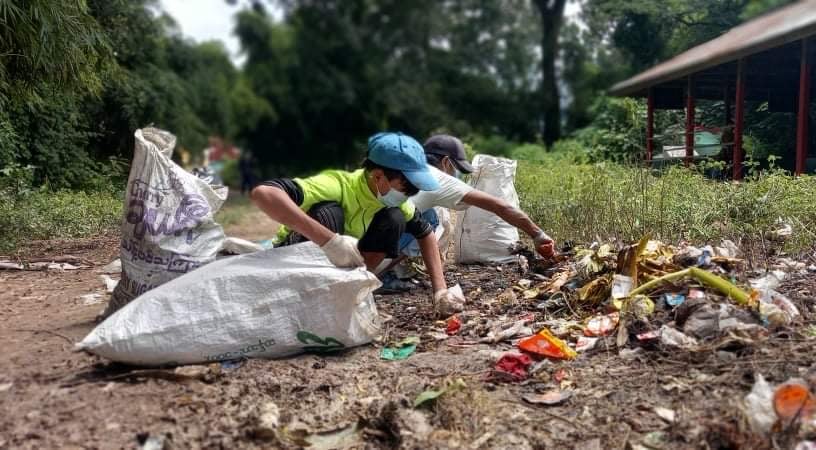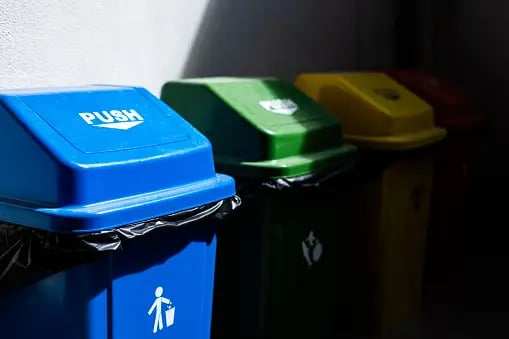Contact us if you would like a free copy of our Waste Aware course
World Cleanup Day is one of the biggest civic movements of our time, uniting 180 countries across the world for a cleaner planet. On 17th September 2022, millions of volunteers, governments and organisations across 191 countries will come together to tackle the global waste problem. Now in its fifth year, over 50 million people have come together to clean their communities and the environment.
Proactive movements such as this come at a time when the global waste problem is so dire that microplastics found in human blood for first time, with scientists finding the tiny particles in almost 80% of the people tested. Microplastics now contaminate the entire planet, from the summit of Mount Everest to the deepest oceans. People were already known to consume the tiny particles via food and water as well as breathing them in, and they have been found in the faeces of babies and adults.
With plastic production is set to double by 2040, the huge amounts of plastic waste dumped in the environment is unsustainable. Sustainable waste management means reducing and avoiding the amount of single-use plastic products along with increasing the amount recycled at the same time, which currently stands at just 8.5%.
Since 1996, the amount of clothes bought in the EU per person has increased by 40% following a sharp fall in prices, which has reduced the life span of clothing. Europeans use nearly 26 kilos of textiles and discard about 11 kilos of them every year. Used clothes can be exported outside the EU but are mostly (87%) incinerated or landfilled. Globally less than 1% of clothes are recycled as clothing, partly due to inadequate technology.
Food waste is the second single largest component of municipal solid waste and has major social, financial, and environmental impacts. According to Biffa, the UK produces the highest amount of food waste in Europe, with an estimated 14 million tonnes of food waste each year, records the European Commission. That’s almost twice the amount of Sweden and Spain and third higher than Germany, the second largest producers of food waste in Europe.
The issue of inefficient solid waste management begins with the impact of food production in the first place, which accounts for more than a quarter of global greenhouse emissions and more than 70% of freshwater withdrawals. Unless we can address overproduction at the source, it seems unlikely that collection systems will be able to deal with the sheer amount of waste produced on any given day.
Sustainable waste management aims to keep materials in use for as long as possible and minimize the amount of solid waste that is disposed of in landfill or through incineration. However, in our existing linear economy, waste begins even before products are manufactured, and a more in-depth approach to sustainable waste management must focus on the entire lifecycle of a product to enable us to help reduce the negative environmental, social, and financial impacts of 21st-century consumption.
Thanks to the emergence of the circular economy agenda and the rise of ethical consumerism, today businesses and individuals are asking more questions and realising that if waste can be prevented, that is much better from a sustainability perspective.
Traditionally, most activity has occurred in the middle or bottom of the hierarchy, for example from recycling and recovery to disposal. Waste producers defined success by having a high recycling rate. Prioritising prevention and reuse proved too challenging as it involved too much stakeholder consultation or having to liaise with procurement departments with a dictatorial position to supply-chain management; often not in the interests of sustainability.
The myth of recycling being the ultimate success criteria has been further enhanced by lazy government policy and a very willing waste industry. In simple terms, why would a business model reliant on volume of waste be interested in supporting its clients to prevent the very commodity they desire? The emergence of co-mingled or mixed recycling schemes has made it even easier for organisations to fuel their addiction for higher recycling rates, but at what cost? This mixture of materials is often of such poor quality; it's exported or ends up being incinerated or landfilled anyway. Because of the perversity of the system, the waste producer is still allowed to claim it's been recycled with its head buried firmly in the sand, far away from the reality that the waste has never really been recycled.
The shift in managing waste must filter across the whole system from learning and education, compliance, transparency and accountability and value and service over cost.
Learning and education.
To support you on your ongoing sustainability learning journey, we are offering a free copy of our Waste Aware course
Waste management is a technical discipline. Doing it effectively requires detailed technical, operational and regulatory skills. The challenge for these organisations in educating their people is often logistical, covering a variety of business functions, and with staff on the road spread over large geographical areas.
Rio Learn offers resourceful waste and energy efficiency eLearning courses. Developed with the Energy Institute and the Future Water Association, ResourceAware is a popular choice for those looking at waste management, water consumption, and energy use; while our multiple-module Resourceful course focuses more fully on waste.
The Journey of Waste remains popular for those wanting to understand their legal obligations and associated compliance, and our new Energy Efficiency bundle includes content on monitoring energy and renewables projects.
Contact us if you would like a free copy of our Waste Aware course
Compliance, transparency and accountability.
Corporate waste organisations have a legal Duty of care in relation to waste management and must be proactive in ensuring that potential compliance issues, flagged up by waste management reports, are acted upon. Waste management law is a very complex area to navigate, especially if you operate across multiple sites in the UK.
The waste industry is often criticised for its lack of transparency, particularly in terms of reporting to customers, with significant variation in quality from one provider to the next. This is an area we are seeing organisations requesting considerably more detail, and those contractors that wish to be successful, can use this as a core differentiator. The rise of the Environmental Social Governance (ESG) agenda in the financial services industry is putting further pressure on organisations to provide better non-financial data. This will have a significant impact on the waste industry in the medium term as data undergoes a much greater level of scrutiny than ever before.
Effective waste management and resource efficiency are staples of a progressive circular economy strategy. However, it can be very challenging for organisations that use multiple contractors, as the range of activities undertaken can be highly diverse. This leads to complex procurement processes and multiple waste streams, creating challenges for both data management and compliance.
Selecting a waste contractor used to be about who could do the job for the least amount of money. However, assessing value is now becoming a much more progressive viewpoint as is the sophistication in which procurers make decisions. Whole life costing, assessing suppliers in line with sustainable procurement principles, using the Sustainable Development Goals (SDGSs) as a framework for assessing supplier risk and opportunity are all examples of practices that are now becoming quite prevalent.
Rio’s intuitive interface enables you to track resource usage across electricity, waste, transportation, and more.
With Rio’s pre-configured utility and resource reports, users can easily visualise performance year over year, compare KPIs to absolute and intensity targets, and forecast into the future. Users can also drill down with detailed filters and normalisers such as per FTE or per unit currency.
You can also build custom reports to share with internal and external stakeholders. Value and service over cost.
It’s long past time we faced a hard truth: despite a historic surge in popularity, ESG investing and tick-boxing will not tackle our generation’s urgent environmental and social challenges. Only those who truly adopt and understand sustainability will deliver real impact. Real intelligence and real data are the only solution.
At Rio we believe sustainability is for everyone and our mission is to democratise knowledge of the subject to help us make a positive impact on the planet and society. Our learning management system host hours of free and paid for content targeted at making sustainability and ESG knowledge more accessible to individuals and organisations globally.
By combining market-leading sustainability knowledge with our proprietary AI, Rio puts the power to do better in everyone’s hands at the click of a button. Our platform can be accessed globally by individuals and organisations of all sizes and levels of understanding of ESG, regardless of their role. We have designed a simple to use, intuitive platform that guides a user through their ESG journey – from learning about ESG to managing compliance, collecting data, reporting and implementing recommendations.
Our tool hosts content in multiple languages and services clients with operations across the world. With a powerful team of sustainability and ESG experts behind the development of our product, we are able to deliver an end-to-end solution which supports clients every step of the way. We identify the maturity of an individual or organisation’s ESG journey and tailor our support services to ensure ESG is always accessible – from a cost, time and resource perspective.
Want to hear more about Rio and how our team can support your sustainability journey? Get in touch.










